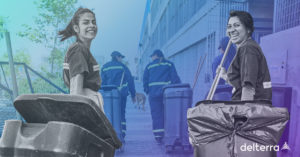
When we think of the waste management and recycling industries we often think of male dominated archetypes: images of trucks, hard hats, landfills, and the “garbage man”. But the waste and recycling industry is changing both in operation and perception and it starts with the increase of women in the industry.
From circular economy leaders like our very own CEO, Shannon Bouton, to the waste workers that keep our streets clean and safe, women are showing to be effective and powerful leaders and changemakers.
At Delterra, we believe that investing in women in leadership is key to diversifying ideas and new solutions brought to the table. Over 60% of our senior leadership are women and women like Larissa Sakamoto and Esther Carter are leading our programs in Olavarria, Argentina and Bali, Indonesia respectively.
Investing in women goes beyond our leadership. At Delterra, we believe women play a crucial role in waste reduction and recycling – from women who run their households, to women waste workers and educators that support our behavior change programs.
Waste Warriors
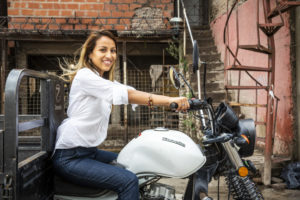 Delterra has identified and cultivated the next generation of sustainability talent in local communities across the world. At our Buenos Aires site, 90% of waste workers are women. Our skills and training programs seek to cultivate these women into the sustainability workforce of the future and unlock new streams of income for their families and the community at large.
Delterra has identified and cultivated the next generation of sustainability talent in local communities across the world. At our Buenos Aires site, 90% of waste workers are women. Our skills and training programs seek to cultivate these women into the sustainability workforce of the future and unlock new streams of income for their families and the community at large.
One example is Daisy, a change agent in Buenos Aires, who has been part of our Delterra team for three years. Daisy coordinates the tasks for the motorcars that help transfer organic and recyclable materials through the small streets of Barrio Murica. As a mother of two, she says it’s important for all of us to play a role in saving our planet, especially for the next generation. For Daisy, one of the best parts of the job is working with other women in the neighborhood.
I love working with people who participate in this project, I feel that I learn more from each of them, and seeing the behavior change in other people motivates me to keep doing the job I love,” she says.
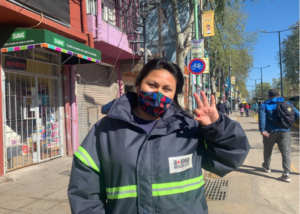 Ximena, a waste worker, has also been with the program in the Barrio for three years. She says her “most beautiful” experience with the program has been talking with her neighbors about recycling. Today, Ximena talks about recycling everywhere she goes–whether it is with her children at home or when she is volunteering at youth activities.
Ximena, a waste worker, has also been with the program in the Barrio for three years. She says her “most beautiful” experience with the program has been talking with her neighbors about recycling. Today, Ximena talks about recycling everywhere she goes–whether it is with her children at home or when she is volunteering at youth activities.
Waste warriors like Ximena and Daisy are leading the way in creating structural waste management programs that are changing the way cities like Buenos Aires recycle.
Leaders empowering their communities through education
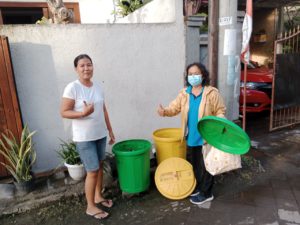
Education and behavior change is essential to the success of our programs and we are thankful to have some strong and passionate education leaders like Wiwik Utami Setiawati in Pemogan Village, Bali. Mrs. Wiwik spearheads a women’s community organization that garnered awards and recognition from the government for their work on women’s empowerment and recycling. She is now a village-appointed educator that works closely with the local waste management and recycling center (TPS3R) and our Rethinking Recycling team.
As an educator, Mrs. Wiwik has a strong desire to empower her community, especially fellow women.
To become a role model in education, you have to first start doing the recycling first and showing how it works, only then can you educate the community,” she says.
Mrs. Wiwik was excited when the Rethinking Recycling Academy came to her village and she hopes the program continues for years to come and for future generations to keep up with recycling to create a better and healthier planet.
Women leading at home and for their children
Women are the backbone of every family and home and it’s no different when it comes to waste management and recycling within the home. Our methodology has identified women as pivotal drivers of behavior change in getting people to recycle. Our community research found that in most households, women are the driving force for recycling and composting. They conduct the waste separation process at home and often do it alone. Our programs aim to support and celebrate them.
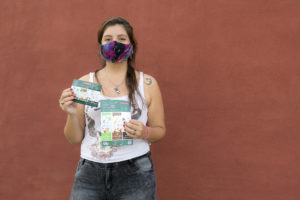 In our newest program in Olavarria, during door-to-door outreach, our team met Diana, a young woman who is passionate about sustainability and creating a better planet for younger generations. When our team told Diana about the new recycling program we were launching in the city, she was excited and empowered to start waste separation right away. Mrs. Wiwik, the educator from Bali, says:
In our newest program in Olavarria, during door-to-door outreach, our team met Diana, a young woman who is passionate about sustainability and creating a better planet for younger generations. When our team told Diana about the new recycling program we were launching in the city, she was excited and empowered to start waste separation right away. Mrs. Wiwik, the educator from Bali, says:
The role of women, especially housewives is crucial in influencing and educating the community. They have to be smart at managing waste at home and knowing which type of waste has high value, so that it can be sold or transformed into different crafts.”
One of the most important things to many women at home is including their children and grandchildren in the experience to empower them from a young age to recycle and protect the planet.
Each neighbor I provide education to in the community, can provide inspiration for their children to keep the environment clean in the future.” says Wiwik.
Women are leading the charge in all aspects of our programs and helping to bring the joy and love of recycling to the next generation. To the women leading this project behind the scenes, thank you for leading by example and with grace. To all the waste workers, change agents and educators that bring the opportunity of saving the planet to every doorstep, and to all the women that welcomed recycling into their homes: thank you for putting the planet on your shoulders on top of everything else.
